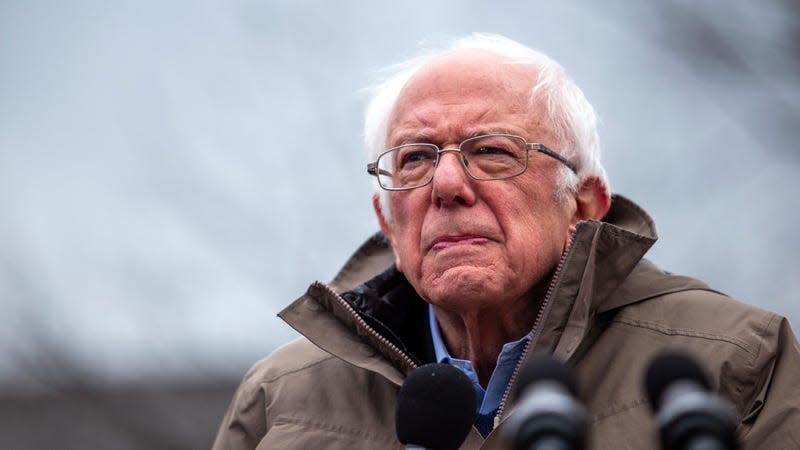Bernie Sanders Is Taking on Ozempic’s ‘Astronomically High’ Price Tag

- Oops!Something went wrong.Please try again later.
Senator Bernie Sanders (I-VT) is taking aim at one of Big Pharma’s newest cash cows: the latest generation of effective obesity medications. On Wednesday, Sanders’ office announced that the senator is launching an investigation into Novo Nordisk over the “astronomically high” list prices of their drugs Wegovy and Ozempic. Both drugs can cost around $1,000 a month or more without insurance coverage.
Wegovy and Ozempic are made with the same active ingredient, semaglutide, which is a long-lasting mimic of the hormone GLP-1. Ozempic was approved in 2017 to treat type 2 diabetes, while Wegovy was approved in 2021 to treat obesity. Though not formally approved for obesity, Ozempic has become increasingly prescribed off-label for it. In clinical trials, those taking Wegovy have lost on average 15% of their baseline weight—well above the typical success seen with diet and exercise alone or with older medications.
The years since Wegovy’s approval have solidified its effectiveness as a treatment for weight loss and beyond. Clinical trials have found that GLP-1 therapy can reduce the risk of complications tied to obesity, such as heart and kidney disease, and some studies have suggested that it may even help reduce people’s unhealthy cravings for alcohol and other drugs. In November 2023, Eli Lilly’s tirzepatide was approved for treating obesity. This drug, which enhances its effectiveness by combining GLP-1 with another hormone, has significantly reinforced the potential of this drug class as a whole.
Impressive as these drugs have been, though, they haven’t come cheap, at least in the U.S. In terms of list price, a supply of Ozempic can run close to $1,000 a month, while Wegovy can cost over $1,300 a month. While some users are fortunate enough to pay much less, insurance coverage of these drugs has been spotty and often short-lasting. High list prices also burden public payers like Medicare, which can lead to drug rationing and restrictive criteria for patient eligibility (Medicare is explicitly barred from covering obesity medications in general, but such drugs can be covered if they treat another approved condition, such as type 2 diabetes or heart disease). And in many other countries, the out-of-pocket costs are substantially lower.
It’s this disparity that Sanders, in his capacity as chairman of the Senate Health, Education, Labor, and Pensions (HELP) Committee, is hoping to address.
“The scientists at Novo Nordisk deserve great credit for developing these drugs that have the potential to be a game changer for millions of Americans struggling with type 2 diabetes and obesity. As important as these drugs are, they will not do any good for the millions of patients who cannot afford them,” Sander wrote in his letter informing Novo Nordisk of the committee’s investigation.
Sanders notes that Novo Nordisk made over $12 billion in profits last year, a 76% jump from 2021, which was largely made possible by the arrival of Wegovy. And while drug makers are certainly entitled to recoup the hefty sums of money needed to research and develop their products, Sanders argues that the company is price-gouging Americans in particular. Ozempic and Wegovy can cost around $100 to $150 in countries such as Germany and the U.K. A recent study from Yale researchers and others also estimated that a month’s supply of Ozempic could be manufactured for less than five dollars a month, even allowing for some profit margin.
The high prices, poor insurance coverage, and regular shortages of the drugs has helped foster a growing black market for them to boot. People can pay substantially less for compounded or counterfeit versions of semaglutide (around $200 to $300 a month), though with no guarantee of its safety and effectiveness. And there have already been reports of people getting hurt as a result.
Given the rising popularity of these medications and the potential patient base (more than 40% of adult Americans are obese), Sanders is also worried about how these high costs will affect the stability of local and federal public payer systems, such as Medicare, moving forward.
“[I]f the prices for these products are not substantially reduced, they have the potential to bankrupt Medicare, Medicaid and our entire health care system. The United States Congress and the federal government cannot allow that to happen,” Sanders wrote in his letter.
Among other things, the committee’s investigation will ask Novo Nordisk to provide details on how its prices for both drugs were determined as well as an accounting of the expenditures needed to bring them to the market.

